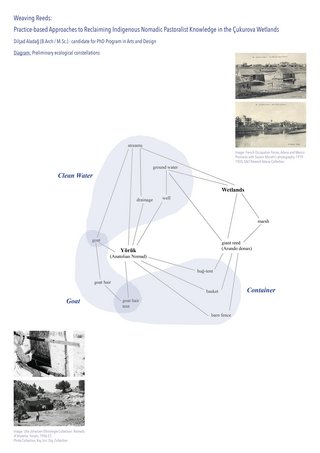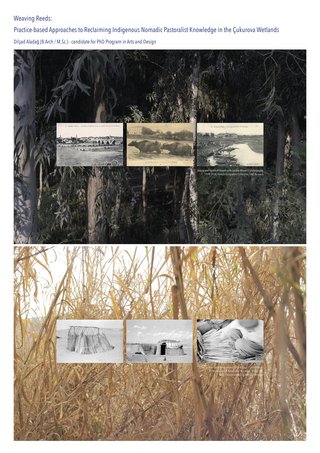DILŞAD ALADAĞ
Fakultät Architektur und Urbanistik
Absolventin European Urban Studies (Master)
betreut an der Professur Arts and Research
THEMA:
'Weaving Reeds: Practice-based Approaches to Reclaiming Indigenous Nomadic Pastoralist Knowledge in the Çukurova Wetlands
BAUHAUS-STARTSTIPENDIUM FÜR DEN EINSTIEG IN DIE PROMOTION
1) Why do you research at the Bauhaus University?
The Doctoral Programme in Art and Design at the Bauhaus-University of Weimar offers a highly beneficial environment for exploring the convergence of artistic, spatial, and environmental aspects. Thanks to the program's structure, having the opportunity to pursue artistic and scientific processes concurrently is a very exciting. Through my cross-disciplinary artistic research, I hope to be actively engaged with and contribute to various research institutions at the university-affiliated.
2) What is special about your project, why is it relevant?
"Weaving Reeds: Practice-based Approaches to Reclaiming Indigenous Nomadic Pastoralist Knowledge in the Çukurova Wetlands" is a PhD project that examines the region of Çukurova, Cilicia, which is a highly industrialized delta plain dedicated to agriculture in southern Turkey. The project focuses on the ecological constellations of nomadic pastoralists, known as yörüks, and the Çukurova wetlands. Once a harbor for multispecies ecology, Çukurova's ecosystem has been 'reclaimed' under the influence of colonial aspirations, nationalist objectives, capitalism, and modernity since the 19th century. Consequently, the Indigenous Nomadic Pastoralist Knowledge was disregarded and oppressed through various spatial and social interventions. Through my project, I aim to explore alternative perspectives on the past and shed light on the exploitation of human and non-human ecologies in Çukurova.
My research will investigate the seasonal, material, and spatial interplays that were once shaped by indigenous nomadic pastoralist knowledge in the Çukurova Wetlands. In response to the exploitative nature of cartography, I will create a counter-cartography that encompasses the gathered findings and generates narratives involving multiple species. This "contra-cartography" will serve as a tool for revealing, remembering, and reclaiming. It will be presented to diverse audiences through exhibitions, lecture performances, and publications within and beyond Çukurova. My childhood experiences in Çukurova were shaped by transhumance, a practice involving the movement between rural and urban landscapes, as well as between summer and winter quarters. This practice was a broken inheritance of my ancestors who was forced sedentarization for the sake of industrial agricultural production. As an artist and architect, I have always been fascinated by the stories of Çukurova, particularly the remnants of nomadic pastoralists' attachment to the landscape and nature. However, these stories were not portrayed with great admiration, as nomadism was not considered a "beneficial" practice either in my family's memory or in the history of the modernizing nation. Given the escalating environmental crisis, the significance of indigenous subjects' ecological knowledge has become increasingly crucial.
With my research, I aspire to reclaim the indigenous nomadic pastoralist knowledge, repairing the memory and creating a glossary as an ecological source for future generations.
>>> ZURÜCK zur Galerie



